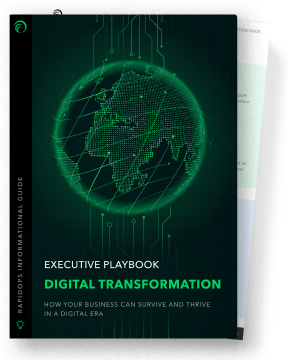- TransformationTrends
- March 2022
2022's Top Digital Transformation Technologies Unveiled
Technology and digital transformation complement each other when organizations decide to disrupt their current processes to accommodate better productivity and efficiency.
Cutting-edge technologies such as IoT (Internet of Things), cloud, big data, AI (artificial intelligence), and ML (machine learning) are some of the top digital transformation technologies.
This article will give an in-depth look and help business leaders understand which of them or a combination of them can increase their operational flow.
We have extensively covered digital transformation in our detailed digital transformation guide, so check it out.
Why is digital transformation important?
Digital transformation initiatives are targeted towards enhancing the operational efficiency of any business. So, in a way, if businesses want to move to more productive business architecture, they will need to disrupt their present process with digital transformation.
Let's see the pros of digital transformation to highlight its importance. With the help of digital transformation, businesses can
- Enjoy enhanced productivity
- Make data-driven decisions
- Streamline their people and processes
- Enjoy cross-department collaboration
What are the technologies in digital transformation?
For better stability in any adverse condition, businesses need to build a dependable operational architecture. This can be achieved by implementing appropriate digital transformation technologies in their current operations.
For businesses, the selection of digital transformation technologies depends on many factors such as
- Business model
- Industry vertical
- Workforce strength
- Future organizational plan
The inclusion of technologies in the business process increases operational efficiency and workforce productivity and adds value to customers.
So, what are the different types of digital technologies?
Let's get insight into the different digital technologies used in a digitized operations architecture to enhance business functions.
1. API-integration

API integration is a core part of digital transformation success. API adoption is the best option if businesses want to build an omnichannel customer experience that can cater to various devices and platforms. Many headless styles are emerging to meet the multi-platform requirement of modern business owners.
That is why APIs are at the center of digital transformation initiatives across enterprises and are successfully powering innovative customer experiences. For a successful digital transformation, businesses need intelligent processes, machines, and other elements, and APIs have the power to integrate them all.
2. Digital twin

A digital twin is a digital copy of products, processes, or tasks that can simulate, collaborate, measure, and predict output information from its physical counterpart.
The digital twin will help reduce the gap between the physical and digital worlds, and it is already finding many practical applications in different industries. Digital twins are helping with better disease diagnosis and manufacturing process optimization.
How? Well, digital twins are capable of providing real-time updates on industrial equipment and other physical assets. This allows manufacturers to use predictive maintenance that helps reduce various maintenance issues and have optimal production output.
The use of digital twins in the healthcare industry is expanding. Drugs manufacturers and healthcare organizations can use digital twins to create valuable models based on patients' information. This information is collected from wearable devices, omics, and patient records.
3. Big data analytics

Data is an essential game-changer in a continuously growing market as it can provide great insights to businesses and facilitate their scalability. The actual challenge lies in data processing.
The number of connected devices has seen a tremendous increase, resulting in the accumulation of data at an exceptional rate. 2.5 quintillion bytes of data are created in structured, unstructured, and raw form every day. This rate is further expected to increase in the coming years.
Implementation of big data analytics will help process data and extract the correct information to be visualized into helpful business insights. Business leaders can work on their strategies and business model based on those insights.
4. Cloud technology

Organizations have realized long back that handling large amounts of data with a traditional structure is not cost-effective or secure. The market saw disruption with the Internet, then the mobile revolution, the big data analytics revolution, and now the metaverse!
How can companies put all of this in remote places? How can the server handle all of these requests on a standalone basis? Cloud technology allows businesses to take a more agile development approach.
Cloud is one of the prominent parts of a digital transformation technology stack that provides businesses with flexibility, scalability, and agility. In other words, the cloud allows companies to scale as per their need, market changes, and user demand.
5. AI/ML

AI algorithms are combined with machine learning to become a core competency of many businesses. Take Google Home, Amazon's Alexa, or Apple's Siri, for example, and you will see the progress AI/ML has made and its potential in the future of digital transformation.
Artificial Intelligence is no longer a decorative term, and organizations of all sizes implement it into their operational and decision-making processes. Combining the AI algorithm with data analytics, machine learning, and high-performance computing can provide excellent business insights.
6. Augmented reality

Although augmented reality is already a well-established technology, it still has the potential to come in handy for many industries in the future as well. It allows businesses to take human-machine interaction to another level.
AR enables seamless connectivity between the physical and digital worlds, making it the go-to technology for many businesses, even in the future. The most useful application of AR technology in business transformation is the maintenance and service industry.
AR devices can help build detailed workflows on how to service and maintain various company assets with complex components and steps. Instead of investing time in building heavy readable manuals with more complex images that have the components numbered in a pamphlet, this can all be shown using AR technology.
Doing so will cut down on training time and costs by helping the service engineers gain more knowledge of their tasks faster and easier.
7. Internet of Things and 5G

IoT and 5G go hand in hand as they complement each other with better speed. These two technologies, when combined, have shown promise of increasing the efficiency of various industries.
The manufacturing industry has taken the most advantage of digital transformation. With the help of the Industrial Internet of Things (IIoT), they are constantly updating their operations to be more innovative, flexible, and efficient.
The retail industry utilizes IoT to increase its customer experience by delivering valuable insights into the entire customer journey. The healthcare industry is using telemedicine for prospering and providing more service value.
The inclusion of 5G in IoT will fasten the information transmission and make the integration better for every industry vertical.
8. Additive manufacturing or 3D printing

Additive manufacturing as a digital transformation technology has shown great promise and is expected to grow tremendously. The best part about this technology is that it allows businesses to produce products faster than the traditional manufacturing methods, makes operations more efficient, and reduces the overall operational cost.
AM is used to create a wide range of products across a growing number of industries, including:
1. Aerospace
The aerospace industry can successfully use additive manufacturing because of its weight-saving capability and its ability to produce complex geometric parts like blisks efficiently.
2. Automotive
The automotive industry is already using various materials made with additive manufacturing as they can be rapidly prototyped while being lightweight and cost-effective.
3. Medical
Custom-fitted implants for hips, joints and other medical devices are successfully being made with the help of additive manufacturing.
Conclusion: Decide digital transformation technology stack as per business use case

These are the top digital transformation technologies for 2022. With the pandemic proving the worth of going digital, the importance of digital transformation is becoming evident with each passing day. Several digital transformation service experts can help you build and execute your digital transformation strategy.
Rapidops has been helping businesses worldwide leverage the full potential of technology, cloud, and AI to devise new efficiencies, opportunities, and experiences. If you want to learn more about our end-to-end solutions and services, get in touch with us. We would love to help you lead your next digital disruption.





